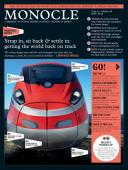
Issue 74
Strap in, sit back & settle in: getting the world back on track. The rising design stars and the new transport hot spots that are charting a course for a new world of mobility — a Monocle Special
In This Issue
Oops! No content was found.
Looks like we no longer have content for the page you're on. Perhaps try a search?
Return Home

